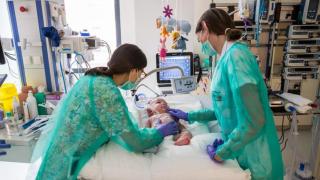A study points to greater risk after living a separation

Childhood has an echo in adult life, especially as far as health is concerned. There is talk of the importance of caring for the habits of the little ones, not exposing them to tobacco smoke and taking care of the way of relating to them, among other things, to avoid physical and emotional problems for the future. However, There is still much to discover in this area. Now, a study has discovered an association between living the divorce of parents in the early stages of life and suffering an stroke in adult life.
The authors used the data from 13,205 American adults over 65 years And they saw that one in nine whose parents had separated had suffered a stroke (stroke). In the group that had not lived this experience in childhood, the figure was one in fifteen. The information was published last Thursday in the magazine Plos One.
The authors isolated most of the risk factors that are known to see the magnitude of this association. After doing so, That relationship was still seen in 61% of cases. In fact, the link is similar in magnitude to two other well -established risk factors for ICTUS: diabetes and depression, establish the authors.

Fernando Castillo, a member of the Spanish Society of Neurology (SEN), warns that this research You cannot establish a causal relationship. Therefore, he continues, comparing this factor, with two that are well demonstrated, such as depression and diabetes, is still adventurous.
Although the reason for this link is not known, those responsible for work theorize that there could be both biological and social factors at stake. “The separation of parents during childhood could cause high and sustained levels of stress hormones”says Esme Fuller-Thomson, one of the Professor Authors of the Factor-Inwentash Faculty of Social Work and Director of the Institute of Life and Aging Cycle of the University of Toronto.
Social factors
For her, this experience during childhood could have “lasting influences in the development of the brain and the child’s ability to respond to stress.” However, Castillo does not agree. He maintains that This relationship should be more to external factors than to changes in the brain itself.
The expert tells that ACVs are “closely related to health habits” such as physical exercise, food and sleep quality. In this sense, living the divorce of parents in childhood could lead to stress and anxiety, for example. In turn, that can cause the child to get his eating behavior or develop sleep problems.
It can also derive later in other harmful factors such as substance consumption, smoking, sedentary or obesity, among others, that trigger the risk of suffering a stroke, says Castillo. “It would be necessary to find what changes in life habits there may be after these circumstances that differentiate them from the people who do not experience them “
Pending work
Although research data cannot establish causality, They show a relationshiptheir authors indicate. Al Sen’s neurologist indicates that this data is crucial. You can see that association between the divorce of parents in childhood and a stroke in adult life, but that does not mean that it is a risk factor or a trigger, he points out.
To verify it, Castillo continues, it would be necessary to carry out a study of cohorts in which social factors could be controlled. “Most likely, behind this, these types of conditions that this work cannot be detected” are “. Until then, “it can be hypothesized, but you can’t draw conclusions.”
Another limitation that the SEN expert finds in the investigation is that Only data from American people have been used. This can complicate the extrapolation of the data to other populations of different customs.
Currently, there are still couples in which Separation or divorce are not an option For cultural or religious reasons, he exemplifies. In these cases, children could suffer even more shock in this situation.
In addition, doing so in people over 65, can also be conflicting. Memory bias can do not exactly remember that moment. The authors add that, in addition, it is a generation in which divorce was not common, which may also have influenced their reaction.
This research is a first step to focus on which it can be a new risk factor to take into account in strokes. However, the authors recognize that it is preliminary and more studies are needed to establish it. “We need to shed light on the mechanisms that can contribute to this association”indicates Fuller-Thomson.
(Tagstotranslate) Scientific research
Source link





